Sufi Practices
 The Sufi’s goal is to have an intimate and loving relationship with Allah. Over the centuries techniques have been developed to help the Sufi focus keenly on the goal and steer away from the many distractions that may cloud this relationship. These are the methods of tasawwuf (known in the West as Sufism), which are designed to take the murid (student) through the levels of nafs (egoistic or animalistic nature), thereby cleaning the obstruction from the spiritual heart, which is the place of connection between Allah and the human being.
The Sufi’s goal is to have an intimate and loving relationship with Allah. Over the centuries techniques have been developed to help the Sufi focus keenly on the goal and steer away from the many distractions that may cloud this relationship. These are the methods of tasawwuf (known in the West as Sufism), which are designed to take the murid (student) through the levels of nafs (egoistic or animalistic nature), thereby cleaning the obstruction from the spiritual heart, which is the place of connection between Allah and the human being.
The Sufi initiate is placed under the spiritual guidance and care of his or her shaykh or shaykha in a mutual pact called biat. It is essential that the shaykh have a personal and continuous relationship with his student, because at the moment of biat, the shaykh places him in a special curriculum, custom-designed to fit his individual spiritual needs. This is called suluk, the murid’s own particular road to Allah, which is regularly monitored by his shaykh.
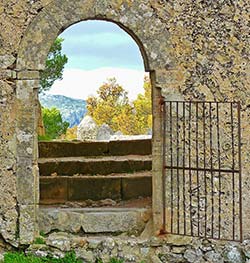 The outer aspect of suluk is the totality of the experiences he will undergo in life, all of which will carry lessons for him to learn and tests by which he will be tried. For example, it may happen that he gets stuck in the same troublesome situation repeatedly. For the murid, this should be taken as a clue to the fact that there is some lesson that he hasn’t quite grasped. If he decides to leave the situation rather than change the thing in himself which gave rise to it, the pattern will repeat itself, until he gets the message and acts upon it. Everything in his world acts as a mirror to him. He will continue to see himself reflected back until he learns to get out of the way, at which point he sees the reality of Allah reflected in all things.
The outer aspect of suluk is the totality of the experiences he will undergo in life, all of which will carry lessons for him to learn and tests by which he will be tried. For example, it may happen that he gets stuck in the same troublesome situation repeatedly. For the murid, this should be taken as a clue to the fact that there is some lesson that he hasn’t quite grasped. If he decides to leave the situation rather than change the thing in himself which gave rise to it, the pattern will repeat itself, until he gets the message and acts upon it. Everything in his world acts as a mirror to him. He will continue to see himself reflected back until he learns to get out of the way, at which point he sees the reality of Allah reflected in all things.
 In suluk the murid learns that everything in the outer world has its inner aspect. In other words, everything is a sign from, and pointing to, Allah. Though he may encounter some strange or miraculous occurences, the salik, seeker, learns to regard such incidences as normal episodes in his Sufi trek through life. As he becomes more alert in his broadened scope of observation, his life becomes a Sufi story. This expanded perceptiveness helps to promote the realization that the realms of spiritual and material reality are not mutually exclusive.
In suluk the murid learns that everything in the outer world has its inner aspect. In other words, everything is a sign from, and pointing to, Allah. Though he may encounter some strange or miraculous occurences, the salik, seeker, learns to regard such incidences as normal episodes in his Sufi trek through life. As he becomes more alert in his broadened scope of observation, his life becomes a Sufi story. This expanded perceptiveness helps to promote the realization that the realms of spiritual and material reality are not mutually exclusive.
Please note that the use of the masculine pronouns in some of these writings is purely for convenience. The Sufi path is open to women and men alike. Likewise, there is no gender implication in the Arabic name “Allah.”
Many of the topics in this section of the website are excerpts from the book The Sun Will Rise in The West by Shaykh Taner Ansari. This book is recommended to readers for a detailed and comprehensive explanation of Sufism that is especially tailored to the Western mindset.
Rabita – Heart Connection
 Unquestionably, the most important of the tools used on the Sufi path is rabita, or heart-connection. At the moment of biat (initiation into a Sufi tariqa), a valve is opened in the student’s spiritual heart, and a spiritual energy connection is made between him, his shaykh, and the entire silsila (line of spiritual ancestors). Herein lies the importance of ijaza, the shaykh’s permission to teach tasawwuf (the Sufi method). With ijaza comes the key the shaykh uses to open his murid’s (student’s) connection to the spiritual chain, the “rope of Allah.” Hence it can be seen that Sufi lineage is not simply a matter of ancestral tradition – it is the dynamic link to Allah’s essence, which is activated at biat and continues to operate through the use of rabita. The silsila as a chain of transmission is the means through which Allah transfers knowledge of Himself to the murid’s heart. It is the cable used to download information, so to speak, from the source. Making rabita is accessing that information.
Unquestionably, the most important of the tools used on the Sufi path is rabita, or heart-connection. At the moment of biat (initiation into a Sufi tariqa), a valve is opened in the student’s spiritual heart, and a spiritual energy connection is made between him, his shaykh, and the entire silsila (line of spiritual ancestors). Herein lies the importance of ijaza, the shaykh’s permission to teach tasawwuf (the Sufi method). With ijaza comes the key the shaykh uses to open his murid’s (student’s) connection to the spiritual chain, the “rope of Allah.” Hence it can be seen that Sufi lineage is not simply a matter of ancestral tradition – it is the dynamic link to Allah’s essence, which is activated at biat and continues to operate through the use of rabita. The silsila as a chain of transmission is the means through which Allah transfers knowledge of Himself to the murid’s heart. It is the cable used to download information, so to speak, from the source. Making rabita is accessing that information.
The Sufi murid should practice the use of rabita continually. He is urged to make a deliberate, thoughtful connection to his heart upon every undertaking in his daily life. At the outset of each activity he is taught to make the mental assumption that it is not he, but his shaykh, who is performing the action. This practice is designed to help the student leave the notion of self-involvement, which in turn leads to the existential knowledge of the illusory nature of his individual self. The mature student of tasawwuf realizes that in making rabita to his shaykh, he is in truth making rabita to Allah.
The murid practices rabita with his shaykh very pointedly while reciting his wazifa (personal zikr, or recitation of Allah’s names). Under no circumstances should a student discuss his wazifa with another murid, as this may breed an unhealthy competitiveness. It is a personal formula to help his purification process, which the shaykh modifies when he sees that an improvement has been made in the murid’s spiritual condition.
 Along with the establishment of connection with the silsila, during the initation process into tariqa, the shaykh employs a technique known as talqin, or inculcation. The practice of talqin is the directed use of the mind to plant the seeds of positive change in the murid’s heart. Through talqin, the heart of the murid is instilled with zikr through the invocation of several of His Beautiful Names. Other ritual prayers are also implanted in the murid’s heart during biat. Throughout the murid’s training, the shaykh is in constant rabita with him, and uses talqin regularly to help his student, often from afar.
Along with the establishment of connection with the silsila, during the initation process into tariqa, the shaykh employs a technique known as talqin, or inculcation. The practice of talqin is the directed use of the mind to plant the seeds of positive change in the murid’s heart. Through talqin, the heart of the murid is instilled with zikr through the invocation of several of His Beautiful Names. Other ritual prayers are also implanted in the murid’s heart during biat. Throughout the murid’s training, the shaykh is in constant rabita with him, and uses talqin regularly to help his student, often from afar.
The shaykh’s job is to protect his murid from spiritual danger by utilizing talqin, both to fix Allah’s light in the murid’s heart and to work against any counterproductive effort made by negative forces. The murid is likewise instructed in the use of this mechanism for self-regulatory purposes, whereby he can make an effort to distance himself from negative attributes. Through the willful mental conditioning of talqin, he intends to convince himself to forego inappropriate thoughts or behavior. His use of talqin can also be beneficial in reinforcing the work of other assigned practices of tasawwuf.
Utilizing rabita is exercising the central tenet and true meaning of Islam, which is surrender. Through continual use of rabita, the murid’s sense of self dissolves in his shaykh, the state known as fanaful shaykh, then in his pirs as fanaful pir, then in the Prophet (peace be upon him) as fanaful Rasul, and, ultimately, in Allah, as fanafullah. This is the true state of self-annihilation, more aptly conceived of as “merging in Allah.” When the murid comes to the indisputable realization that he truly does not exist, he understands the real truth of “La ilaha ilallah,” that Allah alone exists.
Adab – Good Manners
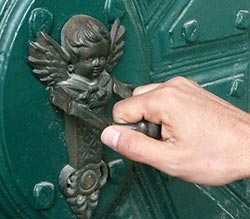 In the process of cleansing through the levels of nafs (egoistic or animalistic nature), the murid (Sufi student) achieves good ahlak, or beautiful character. These are the noble traits that adorned Prophet Muhammad (peace be upon him), and helped bring him to closeness with Allah. Good ahlak will carry the murid through life’s circumstances with grace and fortitude because it is the seedbed of righteous conduct.
In the process of cleansing through the levels of nafs (egoistic or animalistic nature), the murid (Sufi student) achieves good ahlak, or beautiful character. These are the noble traits that adorned Prophet Muhammad (peace be upon him), and helped bring him to closeness with Allah. Good ahlak will carry the murid through life’s circumstances with grace and fortitude because it is the seedbed of righteous conduct.
We have placed all that is on the earth as a glittering show thereof, that We may test them: which of them is best in conduct.
Putting good ahlak to use in action is known as the practice of adab. It is the outward manifestation of one’s inner willingness to accept Allah’s decree and to serve his Lord lovingly. Actions performed with adab reflect the realization that, even though Allah has given us the conscious will to make decisions, we do not exercise this privilege independently but only as executors of Allah’s energy and attributes.
Many shaykhs have said that the whole of Sufism is adab. Adab is doing the right thing, at the right time, in the best way possible. It is the way of harmony, acting with deference to the scheme of the whole. The expression of adab is shown in courtesy, politeness, a pleasant social demeanor. It is a way of behaving graciously, which flows from the foundation of an inner attitude of surrender.
Adab in the Sufi Circle
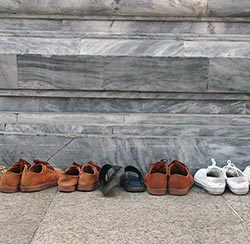 When a dervish (Sufi practitioner) removes his shoes and walks through the entrance of the dergah or tekke, the Sufi center, he leaves the everyday world with its worries and problems outside. The dergah becomes a school in which to practice adab, or good manners, proper behavior and courtesy.
When a dervish (Sufi practitioner) removes his shoes and walks through the entrance of the dergah or tekke, the Sufi center, he leaves the everyday world with its worries and problems outside. The dergah becomes a school in which to practice adab, or good manners, proper behavior and courtesy.
Our attitude in going to the tekke should be humble. We are there to observe, listen and learn. We should treat others as brothers, sisters and decent human beings, and assume that the other attendees are more spiritually developed than ourselves. The tekke is the place to practice a self-effacing attitude to the shaykh and the other murids. It is the place to learn service. One should speak softly, sit quietly, and follow the directions of the shaykh or leader at the time. The talk should focus on Allah, not our nafs (egos; selves). We do not go to the tekke to gossip or to backbite. We go there to talk about Allah so we can get rid of our negative habits. The aim is to control our nafs, which is our mechanical, egoistic nature. One reason to practice adab is because our nafs does not want to.
 The key individual in the adab of a Sufi circle is, of course, the shaykh or shaykha. He or she is the one who sets the tone of the halka (circle). The shaykh decides what will be studied in the gathering, when the activity will begin and when it will end. Communications pass through him. He is the first person the dervish greets when he arrives at the tekke, and the first and last one of whom the dervish takes his leave.
The key individual in the adab of a Sufi circle is, of course, the shaykh or shaykha. He or she is the one who sets the tone of the halka (circle). The shaykh decides what will be studied in the gathering, when the activity will begin and when it will end. Communications pass through him. He is the first person the dervish greets when he arrives at the tekke, and the first and last one of whom the dervish takes his leave.
We learn by listening and observing. If you want to say something while the shaykh is talking, or if you have a question, politely ask the shaykh for permission to talk after it seems that the shaykh may be finished speaking. The shaykh might have you wait because in a teaching circle what is coming through the shaykh’s heart is a direct spiritual message that might be forgotten if he is interrupted.
We may show disagreement with the shaykh or other murids in a respectful way, although this does not mean we are right. If you hear something that you disagree with, put it in the “bag” behind you to be contemplated later. There might come a time when you understand what you had previously disagreed with.
All instructions given by the shaykh to murids should be treated as confidential, just as all personal issues discussed by the murid with the shaykh are confidential. The dervish does not ask a fellow student about her practice or compare his to the others’. Practices are given for the particular person’s guidance and most likely will be quite different than the others’. Discussion of “visions” and other spiritual phenomena are discouraged between murids because of the confusions, as well as subtle competitiveness.
The most destructive and damaging problem in a spiritual group is backbiting. Backbiting occurs when one or more people criticize the character of another individual who is not present. This kind of destructive behavior can destroy a learning circle, and once the damage is done it is difficult to repair. The tekke is the place where the nafs is gradually brought into alignment with reality. It is therefore expected that conflicts will arise. Because of this, adab becomes a practice of extreme importance, not a mere formality.
Good adab with one’s shaykh does not stop outside of the Sufi circle. For example, it is a good practice for the dervish to ask his or her shaykh’s prayers before undertaking any major decision, such as moving, traveling, or other weighty matters. A good attitude to have is to talk with one’s shaykh at least once a week if possible.
Hz. Ahmed er Rifai: On Sharia and Nasiha – Comply with Adab
The path you intend to take openly and secretly has to be upon sharia (Islamic canonical law). Whoever acts like this will be among those desired by Allah. There are ulama (people of knowledge; scholars) and fuqaha (humble servants of Allah), people who are qualified to make judgment upon religious jurisprudence. You may advise people with judgment in sharia, but you have to be careful that you also act with what you preach; do not act as if you are sifting flour, only to give the fine flour to others and end up with the bran for yourself. When you are using your tongue, use it with respect, with wisdom. Let malice and envy not reside in your hearts. Otherwise you will fall into the judgment of “ata muruunan naasa bilbirri wa tansawna anfusakum (You advise others to do good, but you yourselves forget to do it.)” (2:44)
In your attitude and actions you should not have qahr (overpowering demeanor), cruelty, abuse or pride. You should not insinuate that you are better or higher than someone else. You need adab and kindness in the path of nasiha (advice) and giving sermons. The scent of the prime sunna (way or exemplary actions of Prophet Muhammad, peace be upon him) is here. When our Prophet, peace be upon him, wanted to admonish somebody for some shortcoming, he would address the issue in a general setting but would not mention the offending person’s name. I swear that this kind of teaching gives salvation to hearts. What can we say to the person who claims superiority over people and wants to dominate them? O poor person! Turn away from this. Some people’s so-called obedience is in the outer form only. Their hearts have not bowed down. When reality is distinguished from the hal (state of being; situation), the heart will turn away from you and you will be under its feet.
You people who want to be superior and to dominate others cannot avoid the danger of falling into istidraj, Allah’s gradual lure into sin as a trial, because you want to follow your nafs (egoistic or animalistic nature). In truth, divine jealousy will not put up with this. – from Guidance to Mysticism, translated by Shaykh Taner Ansari in Grand Masters of Sufism
Surrender – The Foundation of Love
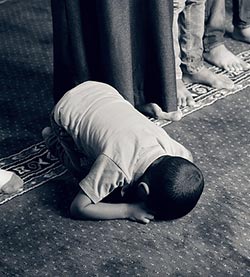 The Sufi wishes to love and be loved by Allah. In tariqa (the Sufi path) he or she follows in the Prophet’s (peace be upon him) footsteps with this single goal in his heart, because he knows Muhammad (pbuh) is Habibullah, Allah’s lover. He understands that the only way to gain Allah’s love is through surrender, for in surrender he denies the selfish urgings of his nafs (egoistic or animalistic nature) in order to secure Allah’s good pleasure. Allah created the Prophet (pbuh) as the model of a human being in a state of complete surrender to his Lord. His exquisite state embraced the perfect balance of his inner and outer being. The key to this balance was an unswerving focus on Allah in all things. From the firmness of his faith sprouted his impeccably pure intention to serve his Lord lovingly in thought, word, and deed.
The Sufi wishes to love and be loved by Allah. In tariqa (the Sufi path) he or she follows in the Prophet’s (peace be upon him) footsteps with this single goal in his heart, because he knows Muhammad (pbuh) is Habibullah, Allah’s lover. He understands that the only way to gain Allah’s love is through surrender, for in surrender he denies the selfish urgings of his nafs (egoistic or animalistic nature) in order to secure Allah’s good pleasure. Allah created the Prophet (pbuh) as the model of a human being in a state of complete surrender to his Lord. His exquisite state embraced the perfect balance of his inner and outer being. The key to this balance was an unswerving focus on Allah in all things. From the firmness of his faith sprouted his impeccably pure intention to serve his Lord lovingly in thought, word, and deed.
That is because Allah never changes the grace He has bestowed on any people until they first change that which is in their nafs, and truly Allah is Hearer, Knower.
In the dynamic of their loving relationship, as the Prophet (pbuh) scrutinized the purity of his intention, Allah in turn increased his faith. The Sufi murid (student) is encouraged to reenact such a working relationship with Allah, maintaining focus on Allah with the intention to surrender to Him in every way. Intention is the springboard of surrender, the inner aspect which gives meaning to outer deeds. The intention to act in a way pleasing to Allah is the foundation of faith, because in it is the tacit assumption of Allah’s complete sovereignty. The acknowledgment “La ilaha illallah (There is no god but God)” is implicit in the believer’s pure intention.
 One who knows that Allah holds all power, as our Prophet (pbuh) did, should preface every action by saying, “Bismillah er Rahman er Rahim (In the name of Allah, The One Who Acts with Mercy, The Source of Mercy).” By saying this with sincerity, the believer states that he is acting in Allah’s name, with Allah’s power and not his own. Saying “Bismillah er Rahman er Rahim” is to be in a state of rabita (spiritual connection) with Allah, and is the beginning of surrender.
One who knows that Allah holds all power, as our Prophet (pbuh) did, should preface every action by saying, “Bismillah er Rahman er Rahim (In the name of Allah, The One Who Acts with Mercy, The Source of Mercy).” By saying this with sincerity, the believer states that he is acting in Allah’s name, with Allah’s power and not his own. Saying “Bismillah er Rahman er Rahim” is to be in a state of rabita (spiritual connection) with Allah, and is the beginning of surrender.
Whoever surrenders his whole attention to Allah while doing good, his reward is with his Lord. And for them there will be no fear nor will they grieve.
“Islam” means “Surrender.” Sufism is the way to surrender knowingly, willingly, and lovingly in every action. Sufis must continually surrender throughout their lifetime and its sometimes hard lessons. This insistence on surrender is the key to bringing the Sufi closer to Allah.
 Every Sufi is encouraged not only to observe and emulate Prophet Muhammad’s (pbuh) flawless behavior, but to truly internalize his refined demeanor. This cannot be accomplished without profound surrender. We must begin the process with the intention to surrender willingly, and Allah, Who has all the power, will then help us to realize His love deep within our being. This love is the fruit of surrender, which is the composite of pure intention with good ahlak, manifest in acting with good adab at all times.
Every Sufi is encouraged not only to observe and emulate Prophet Muhammad’s (pbuh) flawless behavior, but to truly internalize his refined demeanor. This cannot be accomplished without profound surrender. We must begin the process with the intention to surrender willingly, and Allah, Who has all the power, will then help us to realize His love deep within our being. This love is the fruit of surrender, which is the composite of pure intention with good ahlak, manifest in acting with good adab at all times.
Surrender is an ongoing practice. Just as there is no end to Allah’s infinite grandeur, there can be no limit to our willingness to yield to our Maker. When the Sufi murid makes rabita with his shaykh, with the intention of fighting his nafs and acting in Allah’s name, the channel between him and the Creator opens up in his heart. This line of Allah’s life and love widens with each effort made on the part of His servant.
As the beginning of surrender is in the pure intention to act in Allah’s name, the completion of surrender is in the outer aspect of right action. Right action is propelled from the heart of one who has been cleansed from his nafs’ interference, and is shaped by his excellent character.
For a Sufi, being close to Allah is reaching a state of nothingness, whereby one is a fitting vehicle through which Allah may act as He wills. The point of Sufi training is not to gain in spirituality, but to realize one’s nonexistence and thus to better know, praise, and serve the One who exists.
Zikr – Remembrance of Allah
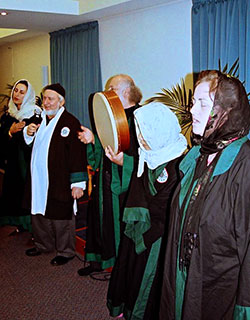 One of the most treasured practices of the Sufi path is zikr, the remembrance of Allah. To be in unity with Allah is to be in a constant state of remembrance of the source of all creation. In the sense that unity is the deepest state of surrender to Allah, this is the true zikr, and is the goal of the Sufi path. As a means to achieve that state, zikr as a ritualized practice was bequeathed to students of tasawwuf (Sufism) by Prophet Muhammad (peace be upon him).
One of the most treasured practices of the Sufi path is zikr, the remembrance of Allah. To be in unity with Allah is to be in a constant state of remembrance of the source of all creation. In the sense that unity is the deepest state of surrender to Allah, this is the true zikr, and is the goal of the Sufi path. As a means to achieve that state, zikr as a ritualized practice was bequeathed to students of tasawwuf (Sufism) by Prophet Muhammad (peace be upon him).
Hazrati Ali (may Allah be pleased with him) was the first one to ask the Prophet (pbuh) about the path of zikr. He asked him to teach him the closest, most precious, and the easiest way. Upon this, the Prophet (pbuh) waited for the angel Jibril (Gabriel, [pbuh]) to come. Jibril (pbuh) came and he inculcated “La ilaha illallah” into the Prophet’s (pbuh) heart three times. Our Prophet (pbuh) repeated this the same way and then taught it to Hazreti (Honorable) Ali.
There are two forms of ceremonial zikr: jahri, or outward zikr, in which one’s voice can be heard by others, and khafi, or silent zikr, in which it can be heard only by oneself. The jahri style was taught by the Prophet (pbuh) to Hz. Ali and the khafi style to Hz. Abu Bakr.
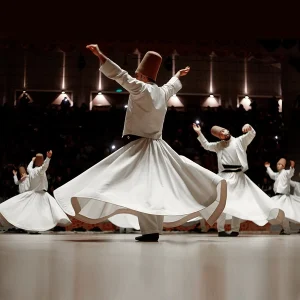 The ritual ceremony of zikr is traditionally held in a Sufi gathering-place known as the dergah or tekke. In this setting the members of a Sufi tariqa (order) together intone certain Names of Allah, thereby invoking the characteristics represented by those Names into the hearts of the congregation. There is a traditional order in which Allah’s Names are mentioned in zikr, and each one is repeated several, often hundreds of times in unison by the group. Certain movements, such as swaying back and forth or turning from right to left, are incorporated into the activity during the intonations, and are likewise performed in unison. In some tariqas a prayerful rotation of the whole body, arms extended while pivoting on one foot, is traditional.
The ritual ceremony of zikr is traditionally held in a Sufi gathering-place known as the dergah or tekke. In this setting the members of a Sufi tariqa (order) together intone certain Names of Allah, thereby invoking the characteristics represented by those Names into the hearts of the congregation. There is a traditional order in which Allah’s Names are mentioned in zikr, and each one is repeated several, often hundreds of times in unison by the group. Certain movements, such as swaying back and forth or turning from right to left, are incorporated into the activity during the intonations, and are likewise performed in unison. In some tariqas a prayerful rotation of the whole body, arms extended while pivoting on one foot, is traditional.
(This lamp is found) in houses which Allah has allowed to be exalted and that His Name will be remembered therein. In them He is praised in the mornings and evenings.

Each of the Beautiful Names invoked during zikr is a key to a spiritual level within the heart. In the midst of such spiritual concentration, participants sometimes travel to profound dimensions of reality. This refreshment to the soul helps to provide encouragement to the murid (Sufi student) in his sometimes difficult journey to Allah. The effect of zikr in the group is to enable each one present to benefit from the augmentation of spiritual energy that a unified effort achieves. In such an atmosphere of concentrated spiritual energy, it is not uncommon for unseen beings such as angels and other spiritual personages to attend the proceedings, thereby bringing additional blessings from Allah.
Murids who have been initiated into tariqa are assigned a personal zikr, called wazifa, by their shaykh or shaykha. The wazifa is a personal spiritual prescription designed to bring the student through the levels of nafs (egoistic or animalistic nature) and to an abiding close relationship with Allah. Over time, and in response to the murid’s progress, the particularities of the wazifa may change.
Everything in the Universe is Making Zikr
by Shaykh Taner Ansari
Whether you see it or not, whether you believe it or not, everything in the universe is praising Allah. When you find the truth, you can see it. All things are praising Allah, by turning, by vibration, by motion. So are you, all human beings, all of the animals, everybody. Your heart says Al-lah, Al-lah, Al-lah – this is how it beats.
Can you live without breathing? You cannot. Allah says in Quran-i Karim (Generous Qur’an), “We put the summary of what you do around your neck.” What do we have around our necks? There’s a voicebox and an air passage. Each time we breath: hhhu, hhhu, hhhu – this hhhu is the name of Allah, Hu. In Judaism it’s Ya Hu Wah, in Islam, Ya Hu. You are saying His name, whether you want to or not. This is the way your body makes zikr, the remembrance of Allah. Allah gave you the ability to control some things, and expects you to join the cosmos and use your body willingly, consciously, and knowingly by making zikr. Although you are already making zikr involuntarily, put your consciousness there now: Hu, Hu, Hu. Alter it a little bit and make it your own. This is what Allah is expecting from you.
When you know the truth – that there is God and there is you – you have a responsibility to uphold the truth. Allah created the whole universe for a purpose, including you. If you know this purpose, and act according to it, you will be in harmony with Allah’s purpose and you will be happy. Happiness is centered in the heart. It is the heart taking control of the brain. If your heart is happy, everywhere else within you is happy. Allah says in the Holy Qur’an, “Hearts find peace only with the zikr of Allah.” If you want peace in your heart, you have to make zikr. If you want peace in your brain, you have to surrender. Shut the mind up and surrender it to your heart.
Hz. Abdul Qadir Geylani on Zikr
Allah the Most High says: “Make zikr of Him as he has guided you.” (2:198)
This generous ayat (verse of the Qur’an) shows the way to the ones who want to make zikr (remembrance) of Him. Another meaning of this ayat is to make zikr of Him in accordance with your spiritual level.
The following hadith sharif (honorable tradition) was granted by our Prophet, peace be upon him: “The most valuable zikr is the one done by me and the prophets before me: La ilaha illallah.”
This shows us the best zikr. It means there is no other Allah (God), but Allah Himself.
There are levels special to each station of zikr. These zikrs are either done jahri (outwardly; aloud) or khafi (silently; hidden), in other words, either with open voice or by the heart.
Zikr is made first by the tongue, then it passes to the nafs (egoistic or animalistic nature). Next it comes to the heart, then it passes to the ruh (spirit; soul). Then it happens in the realm of sirr (the secret), deeper even than the heart, then in khafi (the hidden) and later in the khafi of khafi. These zikrs are given degrees in accordance with Allah’s guidance.
The zikr done with the tongue is similar to the one done with the heart. If it is being done through the tongue, it is known that Allah is not forgotten in your heart.
When the zikr is done through the nafas (breath), zikr is done inwardly. There is no letter, and no voice is heard. It is done with inner motion and feeling.
The zikr of qalb (the heart) is to feel the manifestation of Jamal (Allah’s Beauty) and Jalal (Allah’s Power) in the heart’s essence.
The product of the zikr done with ruh enables you to attain the light manifestation of Allah’s Jalal and Jamal attributes.
The zikr done in the realm of sirr takes you to observance of the divine attributes.
The khafi zikr (silent zikr done by the heart) brings you to the observance of the light that shines at the zat (essence; person) of ahadiya (level of unique oneness), at the headquarters of the righteousness of the mighty Sultan. The zikr that is called the secret of secrets allows you to reach the reality of the station of haqq al-yaqin (sure knowledge received in the heart directly from Allah). You must know that no one besides Allah can peer into this secret of secret state, which is called khafi al-akhfa (secret of the secret state). The following generous ayat relates this as: “He knows the secret and the deeper secret.” (20:7)
This phenomenon encompasses all of the ilms (kinds of knowledge), and all of the [spiritual] purposes [or intentions] reach there.
As a consequence of making the zikrs described above, a different kind of ruh finds a chance for manifestation. It is more latif (subtle; pleasant; gracious) than all of the other ruhs related above. They call this tifl-i maani (child of the spirit or heart; spiritual child).
Furthermore, it is the host who invites you to attain the stations and states described above, and from there to the zat of Allah.
This spiritual state is not found in everyone, but only in the khawas (distinguished) servants. The following ayat-i karim (generous verse of the Qur’an) explains this to us: “He places that ruh into the hearts of his servants He chooses.” (40:15)
This ruh is stationed in the realm of Power. It occupies space in the realm of mushahada (observation; witnessing). It is also a property of the realm of haqiqa (reality; truth). It does not show any tendency toward anything except the zat of Allah. Our Prophet, peace be upon him, says the following to explain these phenomena:
“Dunya (the material world) is forbidden [unlawful] to the people of akhira (the hereafter). Akhira is unlawful for the people of dunya. Dunya and akhira both are unlawful to those who would want Allah’s zat.”
This ruh is tifl-i maani. Reaching Allah happens through this.
In order to protect the decrees of sharia (Islamic canonical law), it is necessary to make the body follow the straight path. It is necessary to continue doing the zikrs of Allah openly or secretly, day or night. It is fardz (obligatory) to do zikr of Allah for those who are seeking the path to Haqq (The True; Allah’s name or attribute Al Haqq). The following generous ayat shows us why this is necessary: “Do zikr of Allah standing, sitting, and reclining.” (4:103)
He grants again: “They do zikr of Allah standing, sitting and reclining, and contemplate the wisdom of the creation of the heavens and the earth.” (3:191) – from Secret of Secrets, translated by Shaykh Taner Ansari in Grand Masters of Sufism
Sohbet – Sermon of Divine Inspiration
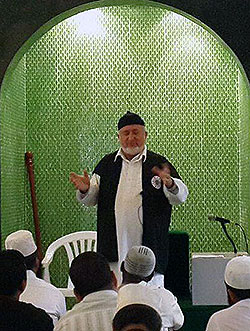 In a holy hadith (tradition or saying of Prophet Muhammad), the Prophet (peace be upon him) said, “Acquiring knowledge in company for an hour in the night is better than spending the whole night in prayer.” Therefore, one of the most significant tools used by the shaykh in tasawwuf (the Sufi method) is sohbet, the discussion of spiritual matters. In this traditional Sufi practice, the shaykh sits in a circle with his murids (students) and proceeds to give an inspired talk on a pertinent spiritual subject. These words are direct teachings from Allah by way of Haqq-al-Yaqin (direct knowledge from Allah) operating in the heart of the shaykh. It may be that the message is coming via one of the members of the silsila (chain of spiritual ancestors) to the shaykh’s heart, yet it is understood that the form in which it is delivered does not diminish the fact that it is knowledge from Allah. One’s attentive presence at sohbet may be more important to the murid’s spiritual growth than any other tool of tasawwuf, with the exception of rabita (heart-connection with the shaykh).
In a holy hadith (tradition or saying of Prophet Muhammad), the Prophet (peace be upon him) said, “Acquiring knowledge in company for an hour in the night is better than spending the whole night in prayer.” Therefore, one of the most significant tools used by the shaykh in tasawwuf (the Sufi method) is sohbet, the discussion of spiritual matters. In this traditional Sufi practice, the shaykh sits in a circle with his murids (students) and proceeds to give an inspired talk on a pertinent spiritual subject. These words are direct teachings from Allah by way of Haqq-al-Yaqin (direct knowledge from Allah) operating in the heart of the shaykh. It may be that the message is coming via one of the members of the silsila (chain of spiritual ancestors) to the shaykh’s heart, yet it is understood that the form in which it is delivered does not diminish the fact that it is knowledge from Allah. One’s attentive presence at sohbet may be more important to the murid’s spiritual growth than any other tool of tasawwuf, with the exception of rabita (heart-connection with the shaykh).
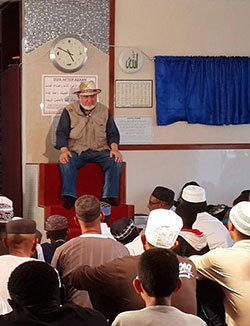
During sohbet, the shaykh may teach a lesson by telling a story. Sufi storytelling is a tradition whereby the shaykh can elucidate a point in a subtle way, so that a student may be admonished, for example, without being embarrassed in front of his peers. It is crucial for Sufi shaykhs and followers of the path to make painstaking attempts to not break anyone’s heart, as this is Allah’s seat in the house of the human being. The shaykh knows when a heart can withstand a strong reproof, and when a more delicate handling of the matter is necessary. Sufi stories provide one means for such subtlety, while simultaneously opening an avenue for thoughtful reflection, for often the stories pose a conundrum that is not readily understood. In a similar way to a Zen koan, these tales can lead the contemplative student to deeper levels of understanding and enlightenment.
On Sohbet
by Hz. Ahmed er Rifai
Awliya (protecting friends; saints) are like bridges on the road to Haqq (Truth; Allah). People go towards Allah by passing over them. They are the owners of sincere, pure deeds and they are the people of purity and sincerity. Allah has saved them from the attachments of masiwa Allah (other than Allah) and has honored them with nearness to Him. There are no veils over their hearts. They abstain from revealing the divine secrets that they have been allowed to see. They are in constant contemplation and zikr (remembrance [of Allah]). “Rijaalullaa tulhiihim tijaaratun wa laa bay’un ‘an zikrillah ([Those] whom neither merchandise nor sale beguiles from remembrance of Allah)” (Qur’an 24:37) These are the people mentioned here.
I advise you that, after you learn the religious responsibilities, you should be in the sohbets of these exalted people. They possess the delight of truthfulness, the pleasure of loyalty, and yearning for the Mawla (Master; Allah). The likes of these qualities cannot be attained by studying lessons, but by being in the presence of the shaykh who possesses the knowledge of hal (state of being; situation; status) and the knowledge of qawl (utterances; words; wisdom). Awliya take and make use of wisdom wherever they find it; they are not particular about where it comes from. They do not discriminate as to who said it, even if an unbeliever narrated it, and thus they say, “yatafakkaruuna fi khalkissamaawaati wal ardi rabbana maa khalaqta hadha batilan (They contemplate the creation of the heavens and earth (and say) ‘You did not create these for nothing.’)” (3:191)
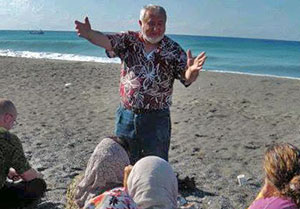
Make sure that the shaykh you want a connection with is kamil (mature). The nature or incomplete hal of the shaykh manifests, batin to batin (inner to inner), subliminally, in the murids (students; ones who long) or dervishes (Sufi initiates of a certain level). If the shaykh is mature, the murid will be mature and will advance and reach his destination. If the shaykh is incomplete or lacking, he causes the murid to be incomplete and not reach the goal. For that reason, you shaykhs, make sure that you do not transfer any incompleteness to those who connect with you.
Contemplation

Contemplative meditation is another practice prescribed for the student of tasawwuf, by which he or she hopes to reach the enlightenment of spiritual knowledge. The deep contemplation of the Sufi is known as tafakkur. In tafakkur, the murid (Sufi student) poses a question in his mind, makes rabita (spiritual cnnection) to his heart (to his shaykh, to Allah), and waits for the answer to reveal itself. Along the way, he uses deductive reasoning to help his mind work in conjunction with the heart. The mind asks the question, the heart answers, and the mind acts as interpreter, bringing the solution to the forefront of consciousness with clarity.
Hz. Abdul Qadir Geylani said in Secret of Secrets:
“Whoever contemplates divine knowing, and wishes to attain a complete sense of knowledge about Allah The Most High, his contemplation equals a thousand years of ritual worship. The real knowledge of knowing is this. By this knowledge I mean the state of unity. The one who knows reaches his Beloved, the One whom he misses, through this. The end of this state is to fly spiritually to the realm of real closeness.”
The Honor of Aql
by Hz. Ahmed er Rifai
The greater alem (realm; world) is aql (intelligence; mind; the power of understanding and discrimination), and it is with you. You understand what and who you are in the context of where you exist with this aql. This is because, if your existence and your corporeality had not had the honor of including such a greater realm, you could not occupy your prime position or state of being. When you show an effort befitting the fleshly figure that possesses such a valuable realm, the greater alem that exists in you shines everywhere and can take you to great heights of accomplishment.

Allah has ordained all transactions based on aql. Whatever He gives, He gives according to aql; whatever He forbids, He forbids according to it. Union, separation, expansion, contraction are all connected to aql. It is the honor of the universe; it is the first created of all facets of humanity. Our Prophet, peace be upon him, has professed, “Aql is the first creation.” If you make an effort for your name and honor to be elevated with this spiritual being you possess, and to avoid belittling your humanity, you will be saved from getting stuck behind veils and will be elevated.
Aql can possess and hold ilm (knowledge; science). For the created, the honor of ilm is with aql. Ilm is completed with aql. Imam al-Shafi said, “Reigning without aql is like sitting on garbage and, more than that, it is a post of humiliation.” Some say ilm is higher than aql. This saying pertains to the divine ilm, because divine knowledge is among the attributes of the eternal. As for aql, it is created. If our aql and ilm are weighed, we find out that aql is on a higher level because if there is no aql, there is no ilm. If a person with aql falls down, we are sure that he will get up, but if a fool without aql falls, we are afraid that he may not be able to get up.
– from Guidance to Mysticism, translated by Shaykh Taner Ansari in Grand Masters of Sufism
On Contemplation
by Shaykh Taner Ansari
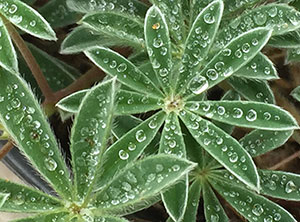
All humans have nafs (egoistic or animalitic nature), brain and a line to God. We have to find the correct way. Allah is Rahman and Rahim (Merciful), so He helps us find the right course by logic, by contemplating and deduction. The first thing you have to accept is that there is a God, but it’s not you. Our job is to find our essence through contemplation. Islam is acknowledgment of the fact that there is a God, and don’t try to be God yourself. You have to accept that there are rules and regulations. You have to be in sync with this. Do we have free will? Yes, if we didn’t have free will, Allah wouldn’t have created us, because Allah wants to be chosen scientifically with our own free will, with no force. If Allah wanted to force us, everyone would believe. Making the choice of choosing Allah has to be the beginning of your life. Everything has to be based on this. This is the truth and this is what we have to make peace with. Islam is making peace with Allah’s decrees and Allah’s systems. This is physics. If you think you have power too, show it to me. I am not going to ask you to make a galaxy. I am going to ask you not to eat again. If you think you have power, do this.
Allah gives you power and He is testing you. Power comes from Al Qadir and Al Muqtadir (names of Allah that describe Allah’s power). Just imagine somebody says, “Please hold on to my money,” as a trust. This is temporary, for safekeeping. You can only spend when the owner says you can. Similarly, this is Allah’s life. He has set up a general course through us. He owns your life. He owns everything. You need His permission for this and that. We are nothing.
A sea turtle hatches 1,000 eggs. Only three of them make it to the sea, and one out of 1,000 will grow to adulthood. Allah makes billions of people, but only a few of these people are going to choose Allah willingly and only a few of them will reach the sea of Love and swim. We are trying to raise consciousness. Allah is doing this with us, through us. I can see this in us. What I noticed is that people are stuck to forms that are related to the five senses. We not only have outer senses, but also inner senses. In order to learn Allah, you have to study both – inner and outer. It is easy for us to go to church and kneel down. It is easy to go to the mosque and do your prayers. But going to the mosque, doing these forms is not the goal. There are certain meanings in these packages. What is the message with these packages? Allah is in constant communication with you, and why are you not in constant communication with your Creator?
Forms make it seem that everything is separate. Allah made it like this to see how hard you are going to contemplate to get to know Allah. You cannot love blindly. Some people are just singing love songs; do they understand what love is? First of all, Allah will love you, then you can love back, and none of this is going to happen if you don’t get out of your comfort zone and act according to your claim.
One of the rules of being a Sufi is that you have to be on the lookout for Allah’s signs. Listen to my advice. Surrender and learn the easy way. My students have to be conscious of what they are doing. Each action has to be willing. I don’t want habitual actions. This is the killer of all faiths. Mean what you say each time.
My students should all be positive – no negativity. We will pray, be positive, we will be patient, we will observe, we will help people in general, and we will not help the people who are doing bad. We are all in this earth together. For Allah there is only one thing – do you acknowledge Him or not? We do not make any distinctions among the prophets. They are giving you the same message. What is the important thing, the prophet or the message? The prophet is helping you establish this iqam al salat, this relationship with Allah.
Contemplation Exercise from Shaykh Taner Ansari
Allah and the universe; you and your body – there is something in common here. What is it? Both have ruh, soul, and body. You are in your body, you don’t see yourself or the ruh but you see the manifestations, which are perceived by these eyes and these five senses. Allah is in this universe too; what you are seeing is the manifestation. All over the world, especially in Buddhism, there are meditation methods. Now I give you some Sufi meditation:
1. Contemplation of Breathing
You breathe in “Allah” and breathe out “Hu (name of Allah in the third person).” There are two things happening in the universe: passive energy and active energy. You are being with Allah with the breath. You are breathing in Allah – literally breathing in Allah, not the sound of Allah or the thinking of Allah, but the reality of Allah. All contemplation is understanding and getting to the reality, realizing the reality. The reality is when you breathe in slowly through your nose and say, “Allah,” and breathe out with your mouth (and acknowledge it) with, “Hu”. You can sit down and be with Allah through breath. Every moment you should be with Allah with breath. Allah The Most High says in the Qur’an-i Karim (Generous Qur’an):
“Wakulla insanin alzamnahu ta-irahufi’aa unuqihi (The summary of what you do will be put around your neck.)” (17:2) This is what’s happening in your neck.
You have an outer zikr, which your breath is doing and you have an inner zikr, which your heart is doing. Outer and inner have to go together.
2. Contemplation of Heart Zikr
Allah the Most High says in the Qur’an-i Karim:
“Alam ya’ni lillazina amanu an takhsha’aa qulubuhum li zikri Allahi (Has not the time arrived for the believers that their hearts in all humility should join in the zikr of Allah?)” (57:16)
Allah says to join your heart in the zikr of Allah. What is this zikr? It is your heartbeat. Make rabita (spiritual connection) to your heart, listen to your heart when it is saying, “Allah,” and when it is saying, “Hu.” Your heart is pumping in blood with “Allah” and pumping out with “Hu.” Your heartbeat is changing that passive energy into kinetic energy by pumping the blood and Allah’s energy to all your cells for life. Life comes to you from all points, everywhere. With breath you get life from Allah into your lungs, and then your heart pumps it through your whole body to maintain this manifestation with zikr: “Allah Hu.” You can simulate this with your glottal vibration – this imitates your heart. You have breath and vibration. You are breathing in and at the same time vibrational zikr is happening in your body. When you hear this, then you have passed the level of sharia (the body of Islamic religious canons). When you see your body doing zikr in your sleep or awake, you have passed the level of sharia.
So, as you can see, this is true. This is actually happening. Do you see how your existence is totally dependent on Allah? Are you with Allah or not at all times?
There is a correlation between your breath and your heart. When you stop breathing, your heart stops. When your heart stops, your breathing stops. When they both stop, your brain stops. So your manifestation goes into de-manifestation.
When does the heart say, “Allah”? And when does it say, “Hu”? Allah in, Hu out, just like breathing. You should do this contemplation every day.
3. Seeing Allah in Other People
If this is so, you can see this in yourself, right? Go sit in a café; your job is to watch people and not to judge them – just study them and try to see Allah in them and show respect to Allah in other people, not telling them, but by saying “Hu.” Just because they are manifesting nafs, ego, does not mean Allah is not there. As you can see, Allah is in every manifestation, but Allah gives us time to realize and come to terms of endearment so that we can have an exposition of love between us.
All of it starts with good adab – acting the way Allah wants a human being to act. Be connected, thinking, overcome emotion with knowledge, research, and then put into action with the connection, and ask help from the Creator for the result. Everything starts with the intention. Are you intending to be god yourself and reinvent the wheel? Or are you intending to accept what is out there as is and do your part? Intend to find your purpose, your role in this big picture, and intend to do your part voluntarily and then lovingly. This is what is expected of us.
4. The Way to Pray
Our (AQRT) motto is “Ya Wadud (O Love), Ya Salaam (O Peace), Ya Jami (O Togetherness), Ya Nafi (O Goodness).” When we are praying, we have to imagine that energy by going into our hearts, then find that energy and give it to the universe. “Ya Wadud” – distribute love to everybody. “Ya Salaam” – give peace to everybody. “Ya Jami” – put togetherness among everybody. “Ya Nafi” – for goodness. You have to think, live and give, for goodness.
Service – The Sufi Expression of Gratitude
Whatever knowledge one receives on the path to Allah is incomplete and useless if it is not brought from the arena of inner knowledge to the outer field of action. Allah’s wish is to develop mature human beings, well integrated in the spiritual and material worlds. This is why the Sufi’s learning is in the world, and where the fruit of his spiritual attainments is meant to be put to use. Otherwise, his position is as if he had joined an intellectual club — rich in concepts, short on action, and absolutely void of any spiritual advancement. It behooves the Sufi to make service to Allah in the world his or her priority.
On Service
by Hz. Abdul Qadir Geylani
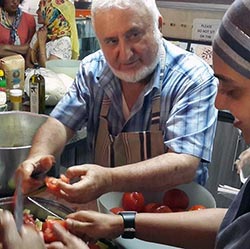
There is zakat (alms; poor-due) in sharia (Islamic canonical law) and there is zakat in tariqa (the Sufi path). According to the laws of sharia, a certain percentage of your worldly income is given to the needy
As for zakat in tariqa, it is given from the earnings for akhira (the hereafter) and is distributed to the poor and needy of akhira. Zakat at the same time means sadaqa (charity). Allah the Most High has revealed this: “Charity is the right of the poor.” (Qur’an 9:60)
The charity given touches the hand of Allah The Most High even before it reaches the poor. What is meant by this is that it is accepted by Allah The Most High.
Now then, these great personalities donate the reward of their good deeds to Allah’s rebellious servants. Allah The Most High, on the other hand, manifests His forgiving attribute in proportion to their acts of salat (formal Islamic prayer), hajj (pilgrimage), tasbih (personal Sufi practice of zikr [remembrance of Allah]) and tahlil (declaration of unity). He covers their evil self [egotism, vanity and such].

Their generosity goes to such extremes that no existence belonging to them remains. They will have [expect] no reward or [admit to any] good deed. The person who enters into this path will have no existence of his own remaining. He lives a hal (state of being; situation; status) of bankruptcy (muflis). Allah The Most High is generous. He loves the generous. He loves the one who is bankrupted through generosity. Our Prophet, peace be upon him, explained this as: “The muflis is in the trust of Allah in both worlds.”
Here let us mention a dua (prayer of supplication) recited by Rabia Adawiya. She used to supplicate thus:
“O Allah, give my worldly share to the unbelievers. If I have any share in the hereafter, distribute it among Your mu’min (believing) servants. I only wish to make zikr of You in the world, and only to see You in the hereafter.”
Because the servant and whatever he is holding in his hand is temporary, they all together belong to the Master. On Judgment Day, every good deed will bring a tenfold reward. Allah The Most High reveals this as: “Whoever brings a good deed will get a tenfold reward for it.” (6:160)
Another meaning of zakat is the cleansing of nafs (egoistic or animalistic nature). When the nafs is cleared of selfish, egotistical attributes, zakat finds its spiritual value. A little worldly possession given in this world brings a manifold reward in the hereafter. This generous ayat (verse of the Qur’an) relays such a meaning: “Who would give Allah a handsome loan so that He may give him a manifold reward?” (57:11) “Whoever purifies his nafs finds salvation.” (Shams 91:9)
The loan mentioned in the above generous ayat means the distribution of part of your worldly gains among some servants of Allah The Most High for the sake of goodness. In this distribution, only Allah The Most High’s beautiful countenance should be kept in mind and material gains should not be sought. Any goodness done or given for Allah The Most High’s servants must be given with compassion; it must not be done to make them indebted to you. Allah The Most High revealed this to us as: “Do not render your charity null with reproach and abuse [to the one who receives it].” (2:264)
Human beings should not request the benefits of worldly things for their good deeds. Another name for this is “infaq” (to spend one’s substance in alms or other good works; supporting others). The following generous ayat tells us why and how this is given: “Unless you spend of that which you love, you will not be able to attain piety.” (3:92)
– from Secret of Secrets, translated by Shaykh Taner Ansari in Grand Masters of Sufism
On Service
by Hz. Ahmed er Rifai
Try to serve people as much as you can. Be merciful to the feeble elders. Feel sorry for the state of the poor when you are rich and give them much sadaqa (alms; charity). With sadaqa, balas (calamities; misfortunes; trials) are dismissed by Allah. Show hospitality to the guest, because our Prophet, peace be upon him, has accepted this as ibada (worship)
Husn-i akhlaq (good behavior) is the best of deeds. It is said, “If you cannot make people happy with material things, make them happy with good akhlaq (manners, habits). The best of good deeds is good akhlaq.”
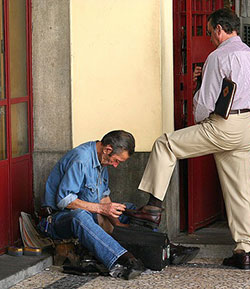
The people who have good akhlaq can attain the same level as people who worship and fast, without doing anything else. Good akhlaq is the best ibada after [next to] Allah’s fardz (compulsory) ibada.
If you do ibada in an irritable state, what good will it serve? Allah is not in need of anyone or anything. He is Al Ghani (The Self-Sustaining One). At the door of servitude, what befits the servant is to wait at the door selflessly. When you are appealing to the Presence of Allah, you must be humble, in a state of fear and awe, admitting your powerlessness and poverty. If you go to the door of Allah, putting your deeds and your nafs (egoistic self; man’s animal nature) aside, with utmost humility, then maybe you will be accepted.
– from Guidance to Mysticism, translated by Shaykh Taner Ansari in Grand Masters of Sufism
